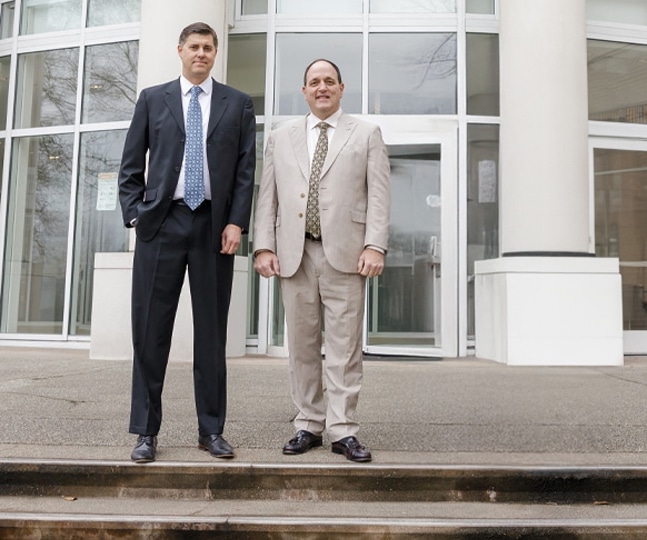Free Case Evaluation

Seattle Bullying and Cyberbullying Lawyers
Our Seattle attorneys treat you and your child with dignity and respect
Bullying can hurt – and when it happens at school or online, it can leave lasting scars. At Smith McBroom, we know how painful it can be to watch your child suffer while nobody seems to help. Whether the bullying is physical, emotional, or digital, it’s not just wrong. It could be a violation of their rights. If your child has been bullied or cyberbullied here in Seattle, and the school failed to protect them, you may have legal options. Our team treats every child and parent with dignity and respect, and we fight to ensure your voice is heard.

How can we help?
- What counts as bullying?
- How should Washington schools respond to bullying?
- What if the bullying involves a child with a disability?
- What if the bullying is online?
- What should a Seattle school do when bullying is reported?
- What are the signs that a school is failing in its duty to prevent bullying?
- Can I sue a school for bullying in Seattle?
- How can a Seattle bullying and cyberbullying lawyer help with my case?
- How do I document bullying for my legal case?
- Do you have a Seattle bullying and cyberbullying lawyer near me?
Free Case Evaluation
What counts as bullying?
According to stopbullying.gov:
Bullying is unwanted, aggressive behavior among school aged children that involves a real or perceived power imbalance. The behavior is repeated, or has the potential to be repeated, over time. Both kids who are bullied and who bully others may have serious, lasting problems.
In order to be considered bullying, the behavior must be aggressive and include:
- An Imbalance of Power: Kids who bully use their power—such as physical strength, access to embarrassing information, or popularity—to control or harm others. Power imbalances can change over time and in different situations, even if they involve the same people.
- Repetition: Bullying behaviors happen more than once or have the potential to happen more than once.
Bullying includes actions such as making threats, spreading rumors, attacking someone physically or verbally, and excluding someone from a group on purpose.
Further, cyberbullying is bullying that happens through technology, like text messages, social media posts, emails, or online forums. It can be even more damaging than in-person bullying because it often follows kids home, spreading quickly and anonymously.
How should Washington schools respond to bullying?
Washington State has some of the strongest anti-bullying laws in the nation. Schools are not just encouraged, but required, to take bullying seriously.
Under Washington law, every public school must:
- Adopt and enforce a written policy prohibiting harassment, intimidation, and bullying (also known as HIB policies)
- Designate a compliance officer who is responsible for handling bullying complaints.
- Train school staff on recognizing and responding to bullying behavior.
- Investigate reports of bullying in a timely and thorough manner.
- Take the appropriate action to protect the bullied student and prevent further harm.
Washington law also requires that students and parents are given clear information on how to report bullying, and how investigations will be handled. If a school fails to do these things, or looks the other way, it could be violating your child’s rights. We can help.
What if the bullying involves a child with a disability?
If your child has a disability, the school has even more responsibility. Under the Individuals with Disabilities Education Act (IDEA) and Section 504 of the Rehabilitation Act, schools must provide students with disabilities a free appropriate public education in a safe environment. Bullying can interfere with that right.
The U.S. Department of Education makes it clear:
…when a school knows or should know of bullying conduct based on a student’s disability, it must take immediate and appropriate action to investigate or otherwise determine what occurred. If a school’s investigation reveals that bullying based on disability created a hostile environment—i.e., the conduct was sufficiently serious to interfere with or limit a student’s ability to participate in or benefit from the services, activities, or opportunities offered by a school—the school must take prompt and effective steps reasonably calculated to end the bullying, eliminate the hostile environment, prevent it from recurring, and, as appropriate, remedy its effects.
So, if bullying is interfering with your child’s learning and the school does nothing, you may have a strong legal claim. This is especially true if the bullying is based on your child’s disability, race, gender, religion, or national origin.
What if the bullying is online?
Cyberbullying is covered under the same Washington law as in-person bullying. Schools must investigate and act if:
- The online bullying disrupts learning,
- Targets a student based on a protected trait,
- Or creates a threatening environment at school, even if it happened off-campus.
Washington law specifically requires school policies to include cyberbullying. If your child’s school says, “It didn’t happen on school grounds, so it’s not our problem,” they are wrong.
What should a Seattle school do when bullying is reported?
Once bullying is reported, either by a student, a parent, or a staff member, the school must take action. This includes:
- Starting an investigation—quickly and fairly.
- Talking to witnesses and collecting facts.
- Notifying parents of the students involved.
- Protecting the victim from retaliation or continued bullying.
- Taking steps to stop the bullying and repair the harm.
If a school delays, ignores reports, or doesn’t take the situation seriously, they could be liable under state or federal law.
What are the signs that a school is failing in its duty to prevent bullying?
Here are some warning signs that your child’s school may not be following Washington law:
- The school doesn’t return your calls or emails about bullying.
- They say it’s just “kids being kids.”
- No one investigates, or the investigation is one-sided.
- The bully continues to attend class with your child with no consequences.
- Your child is moved, but the bully is not.
- Staff know what’s going on but fail to intervene.
You are not overreacting. If your gut tells you that the school is failing your child, it may be time to speak with an attorney. At Smith McBroom, our education attorneys can help.
Can I sue a school for bullying in Seattle?
Yes, in certain cases. Families can sue the school district for failing to protect a student from bullying, especially when:
- The school knew about the bullying and failed to act.
- The bullying was based on a protected class, like race, disability, or gender.
- The bullying resulted in serious harm, like emotional trauma, school refusal, mental health issues, or hospitalization.
You may be able to file a claim under:
- Federal civil rights laws, like Title VI (race), Title IX (sex/gender), or Section 504 (disability).
- IDEA, if the bullying denied your child access to an education.
- Washington state laws, including negligence or emotional distress.
Your child may be entitled to damages, mental health support, or even changes in their educational placement.
How can a Seattle bullying and cyberbullying lawyer help with my case?
Here at Smith McBroom, we focus on holding school systems accountable when they fail to protect your kids. Here’s how we can help:
- We start by listening to your story and reviewing what the school has (or hasn’t) done,
- We push for immediate steps to stop the bullying, change your child’s environment, and get support services in place.
- We can file formal complaints with the school district, the Office for Civil Rights (OCR), or the Washington Office of Superintendent of Public Instruction (OSPI).
- We can push for changes to your child’s IEP or 504 Plan, or request a transfer or additional support.
- If needed, we can help you file a lawsuit to seek justice and protect your child’s rights.
You don’t have to do this alone. We will treat you and your child with the compassion and respect they deserve.
How do I document bullying for my legal case?
If you’re thinking about taking legal action on behalf of your child, here’s what can help:
- Save all communications, including emails to the school, texts, or social media screenshots.
- Keep a timeline – note when the bullying happened and what the school did (or didn’t do) in response.
- Document the impact of the bullying, through report cards, therapist letters, behavioral changes, or school refusal.
- Ask the school for any investigation files or incident reports.
This evidence can help us build the strongest possible case for your child.
Do you have a Seattle bullying and cyberbullying lawyer near me?
Smith McBroom is located at 16400 Southcenter Parkway, Suite #210, Seattle, Washington, 98188. We’re right off I-5 and I-405, near Southcenter Mall. There is a bus stop near our office, and we offer free on-site parking.
Contact our Seattle bullying and cyberbullying attorneys today
No family should have to fight the school system alone. At Smith McBroom, we bring experience, compassion, and determination to every bullying and cyberbullying case we take on. We believe that every child deserves a safe, supportive place to learn, and when schools fail to provide that, we step in. If your child is being bullied and the school isn’t doing enough, don’t wait. There are deadlines for filing complaints and lawsuits. The sooner we get involved, the sooner we can help protect your child’s rights. To set up a consultation, call our offices or fill out our contact form.
